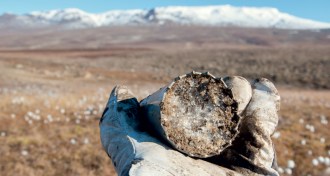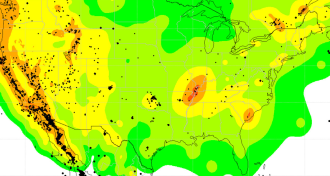Earth
Sign up for our newsletter
We summarize the week's scientific breakthroughs every Thursday.
-
 Earth
EarthBreakups maintain barchan dune fields, somehow
Two new theories try to explain how the crescent-shaped sand mountains persist.
By Erin Wayman -
 Earth
EarthMillions in China at risk of exposure to arsenic-tainted water
Simulation shows possibly contaminated areas and predicts populations at risk.
By Erin Wayman -
 Climate
ClimateFlood damage to cost up to $1 trillion per year by 2050
Coastal cities with growing populations will be inundated by sea level rise.
-
 Climate
ClimateClimate change carved canyons in Andes
Erosion came thanks to cooling and more rain, not tectonic activity.
By Erin Wayman -
 Climate
ClimateThe Attacking Ocean
The Past, Present, and Future of Rising Sea Levels by Brian Fagan.
By Erin Wayman -
 Earth
EarthEmissions could fuel global warming for millennia
Climate simulation projects effects of greenhouse gases farther into the future than ever before.
-
 Earth
EarthMagma can speed to the surface, powering volcanoes
Fast ascent of molten rock could help scientists predict eruptions.
-
 Climate
ClimateWetter permafrost clings to carbon better
In 12-year lab study, moist soil samples released less greenhouse gas as they warmed.
By Erin Wayman -
 Environment
EnvironmentAtomic ant sand
Robb Hermes asked for sand ants to get samples of Trinitite, a material created in the test blasts of the first atomic bomb.
By Devin Powell -
 Earth
EarthMillions of years ago, frozen ice sheet in East Antarctica melted
Warming may have caused ice sheet collapse and huge increase in sea level.
By Erin Wayman -
 Earth
EarthHuge quakes may foretell smaller, human-caused ones
Distant powerful temblors triggered ominous activity at wastewater injection sites.
By Erin Wayman -
 Earth
EarthTaking Antarctica’s temperature
Frozen continent may not be immune to global warming.
By Erin Wayman